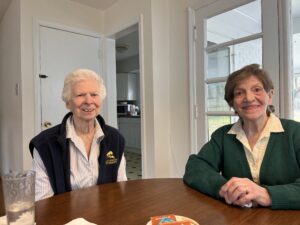
Sisters Carroll Ann Kemp and Carol Ries: religious leaders in the fight against human trafficking.
Religious sisters have played a vital role against violence and human rights perpetrators. They have played a seminal role in their fight against exploitative practices related to human trafficking through advocacy, education, prayer, and interreligious dialogue. According to the Vatican Congregation for the Evangelization of Peoples, about 630,000 religious women live in service to the poor, the marginalized, and others in need of care and support. As Pope Francis once observed, “What would the Church be without religious sisters and consecrated laywomen? The Church cannot be understood without them.”
At the opening of the new millennium, the International Union of Superiors General issued an urgent call to religious congregations to respond to the needs of persons suffering from the global crime of human trafficking. In response, Church leaders organized a three-day workshop in Baltimore for members of faith communities on the East Coast.
The leadership team of the Sisters of the Holy Names of Jesus and Mary invited its members to participate. Six of our sisters responded to this invitation and participated. Following the workshop, several of us met in our living room with those interested in organizing the “next steps” for our work. Gradually the group had grown enough to seek larger space in a local church meeting area. Since then, Sisters Carroll Ann Kemp and Carol Ries have continued organizing monthly meetings under the name of the Mid-Atlantic Coalition Against Modern Slavery (MACAMS), working for the rights of women, men, and children who are victims of human trafficking. Pope Francis calls this work “the responsibility of their faith.”
“What would the Church be without religious sisters and consecrated laywomen? The Church cannot be understood without them.”
– Pope Francis
We recently sat down with two religious sisters residing in Silver Spring, MD, to casually discuss the Mid-Atlantic Coalition Against Modern Slavery. They began many years ago, and at their first meeting, Carroll Ann said, “If each of us brings one more person to learn about this topic, we will grow.” There are now nearly 40 women and men, religious and lay, Christian and Jewish in their coalition. They are a community that shares the same mission to pray, educate, and advocate for victims of this crime of human trafficking.
